EDU40003 - Reflective Philosophy in Early Childhood Education
VerifiedAdded on 2023/06/04
|5
|1096
|392
Project
AI Summary
This project delves into a reflective philosophy within the context of early childhood education. It outlines visionary statements aimed at children, families, colleagues, and the community, emphasizing visual learning, cultural tolerance, and collaborative teaching. The author reflects on their understanding of early childhood development theories, commitment to equality, and dedication to creating an inclusive learning environment. The project underscores the importance of early childhood education in shaping future citizens and the author's role as a practical and empathetic professional in this field. The solution also includes references to various books and journals.
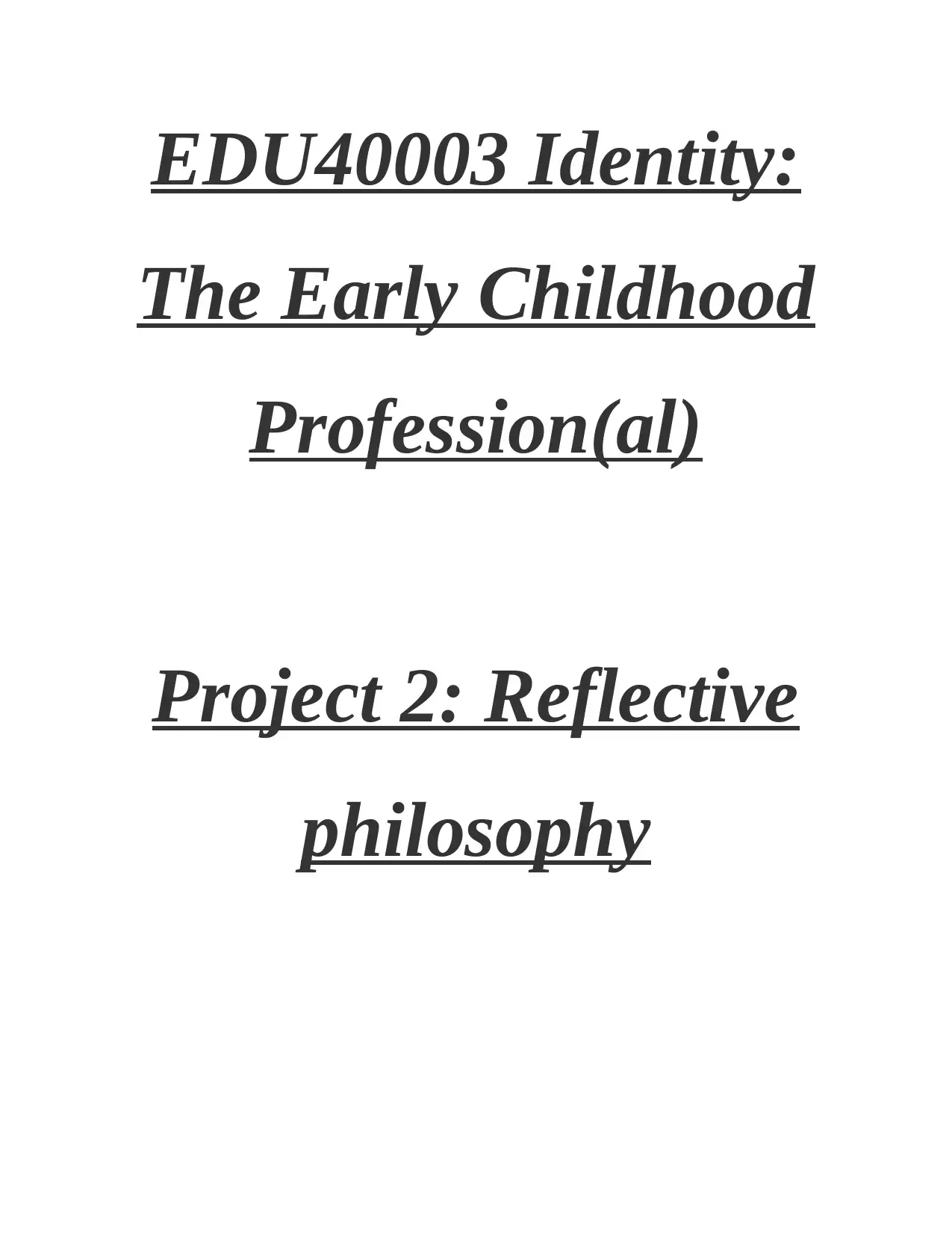
EDU40003 Identity:
The Early Childhood
Profession(al)
Project 2: Reflective
philosophy
The Early Childhood
Profession(al)
Project 2: Reflective
philosophy
Paraphrase This Document
Need a fresh take? Get an instant paraphrase of this document with our AI Paraphraser
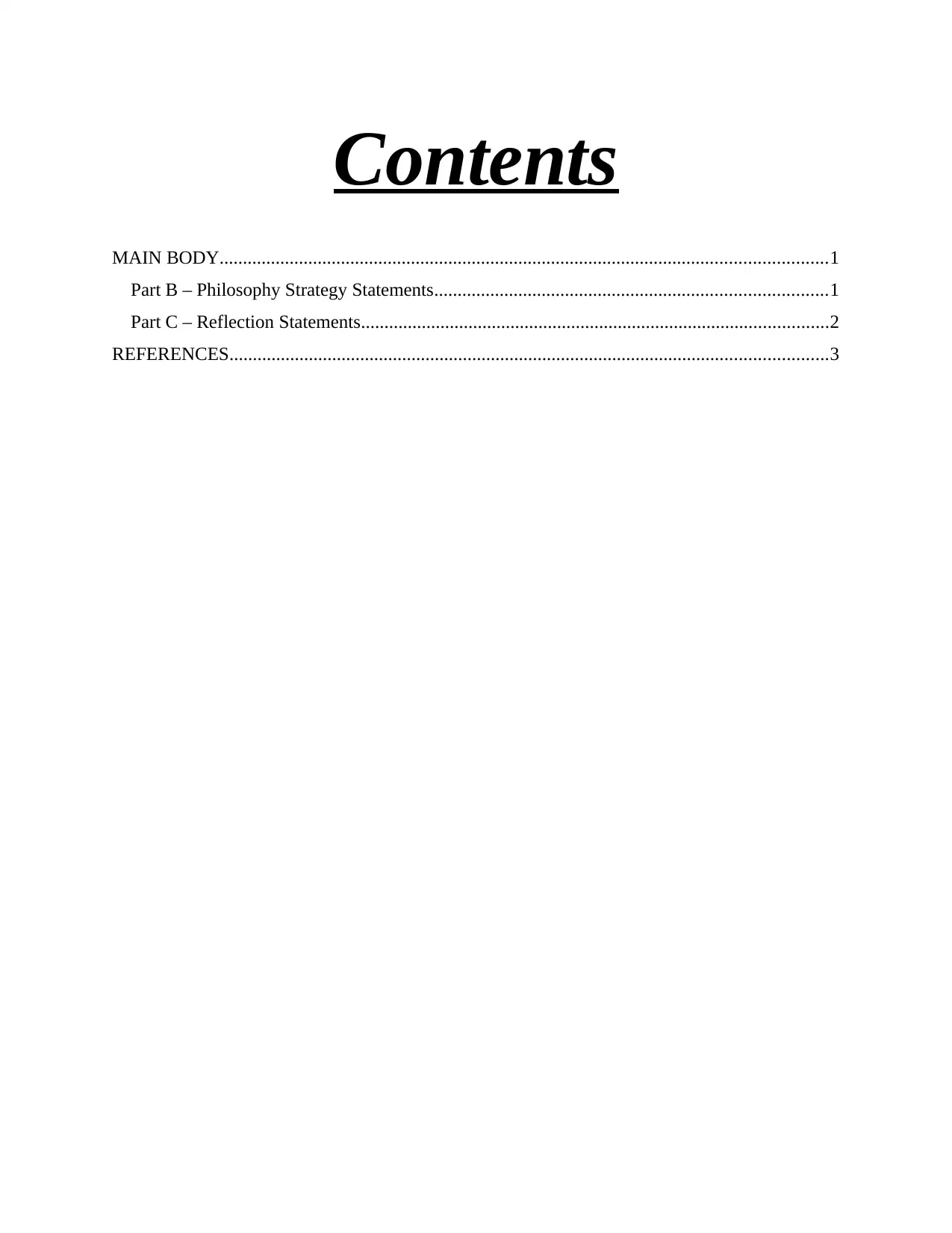
Contents
MAIN BODY..................................................................................................................................1
Part B – Philosophy Strategy Statements....................................................................................1
Part C – Reflection Statements....................................................................................................2
REFERENCES................................................................................................................................3
MAIN BODY..................................................................................................................................1
Part B – Philosophy Strategy Statements....................................................................................1
Part C – Reflection Statements....................................................................................................2
REFERENCES................................................................................................................................3
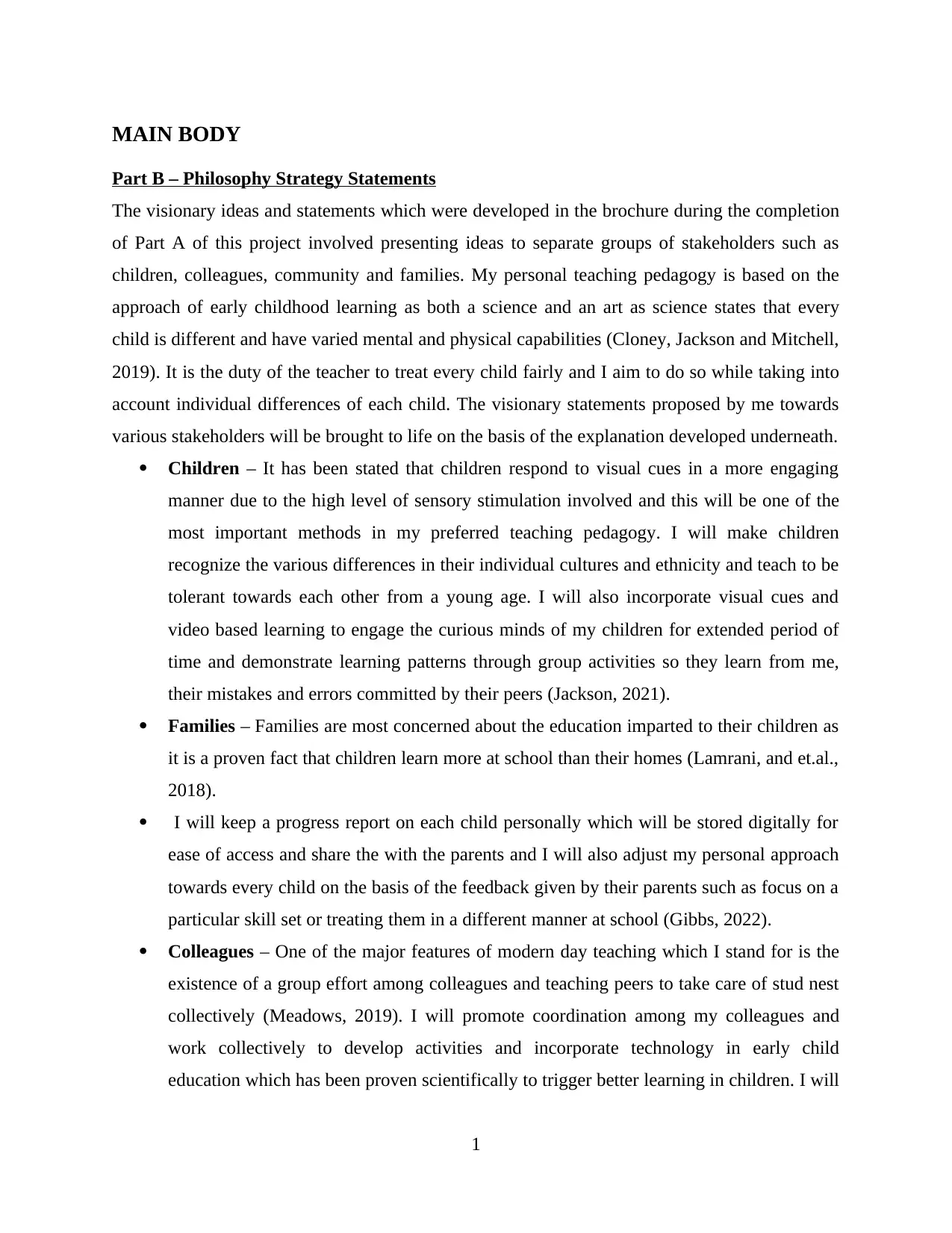
MAIN BODY
Part B – Philosophy Strategy Statements
The visionary ideas and statements which were developed in the brochure during the completion
of Part A of this project involved presenting ideas to separate groups of stakeholders such as
children, colleagues, community and families. My personal teaching pedagogy is based on the
approach of early childhood learning as both a science and an art as science states that every
child is different and have varied mental and physical capabilities (Cloney, Jackson and Mitchell,
2019). It is the duty of the teacher to treat every child fairly and I aim to do so while taking into
account individual differences of each child. The visionary statements proposed by me towards
various stakeholders will be brought to life on the basis of the explanation developed underneath.
Children – It has been stated that children respond to visual cues in a more engaging
manner due to the high level of sensory stimulation involved and this will be one of the
most important methods in my preferred teaching pedagogy. I will make children
recognize the various differences in their individual cultures and ethnicity and teach to be
tolerant towards each other from a young age. I will also incorporate visual cues and
video based learning to engage the curious minds of my children for extended period of
time and demonstrate learning patterns through group activities so they learn from me,
their mistakes and errors committed by their peers (Jackson, 2021).
Families – Families are most concerned about the education imparted to their children as
it is a proven fact that children learn more at school than their homes (Lamrani, and et.al.,
2018).
I will keep a progress report on each child personally which will be stored digitally for
ease of access and share the with the parents and I will also adjust my personal approach
towards every child on the basis of the feedback given by their parents such as focus on a
particular skill set or treating them in a different manner at school (Gibbs, 2022).
Colleagues – One of the major features of modern day teaching which I stand for is the
existence of a group effort among colleagues and teaching peers to take care of stud nest
collectively (Meadows, 2019). I will promote coordination among my colleagues and
work collectively to develop activities and incorporate technology in early child
education which has been proven scientifically to trigger better learning in children. I will
1
Part B – Philosophy Strategy Statements
The visionary ideas and statements which were developed in the brochure during the completion
of Part A of this project involved presenting ideas to separate groups of stakeholders such as
children, colleagues, community and families. My personal teaching pedagogy is based on the
approach of early childhood learning as both a science and an art as science states that every
child is different and have varied mental and physical capabilities (Cloney, Jackson and Mitchell,
2019). It is the duty of the teacher to treat every child fairly and I aim to do so while taking into
account individual differences of each child. The visionary statements proposed by me towards
various stakeholders will be brought to life on the basis of the explanation developed underneath.
Children – It has been stated that children respond to visual cues in a more engaging
manner due to the high level of sensory stimulation involved and this will be one of the
most important methods in my preferred teaching pedagogy. I will make children
recognize the various differences in their individual cultures and ethnicity and teach to be
tolerant towards each other from a young age. I will also incorporate visual cues and
video based learning to engage the curious minds of my children for extended period of
time and demonstrate learning patterns through group activities so they learn from me,
their mistakes and errors committed by their peers (Jackson, 2021).
Families – Families are most concerned about the education imparted to their children as
it is a proven fact that children learn more at school than their homes (Lamrani, and et.al.,
2018).
I will keep a progress report on each child personally which will be stored digitally for
ease of access and share the with the parents and I will also adjust my personal approach
towards every child on the basis of the feedback given by their parents such as focus on a
particular skill set or treating them in a different manner at school (Gibbs, 2022).
Colleagues – One of the major features of modern day teaching which I stand for is the
existence of a group effort among colleagues and teaching peers to take care of stud nest
collectively (Meadows, 2019). I will promote coordination among my colleagues and
work collectively to develop activities and incorporate technology in early child
education which has been proven scientifically to trigger better learning in children. I will
1
⊘ This is a preview!⊘
Do you want full access?
Subscribe today to unlock all pages.

Trusted by 1+ million students worldwide
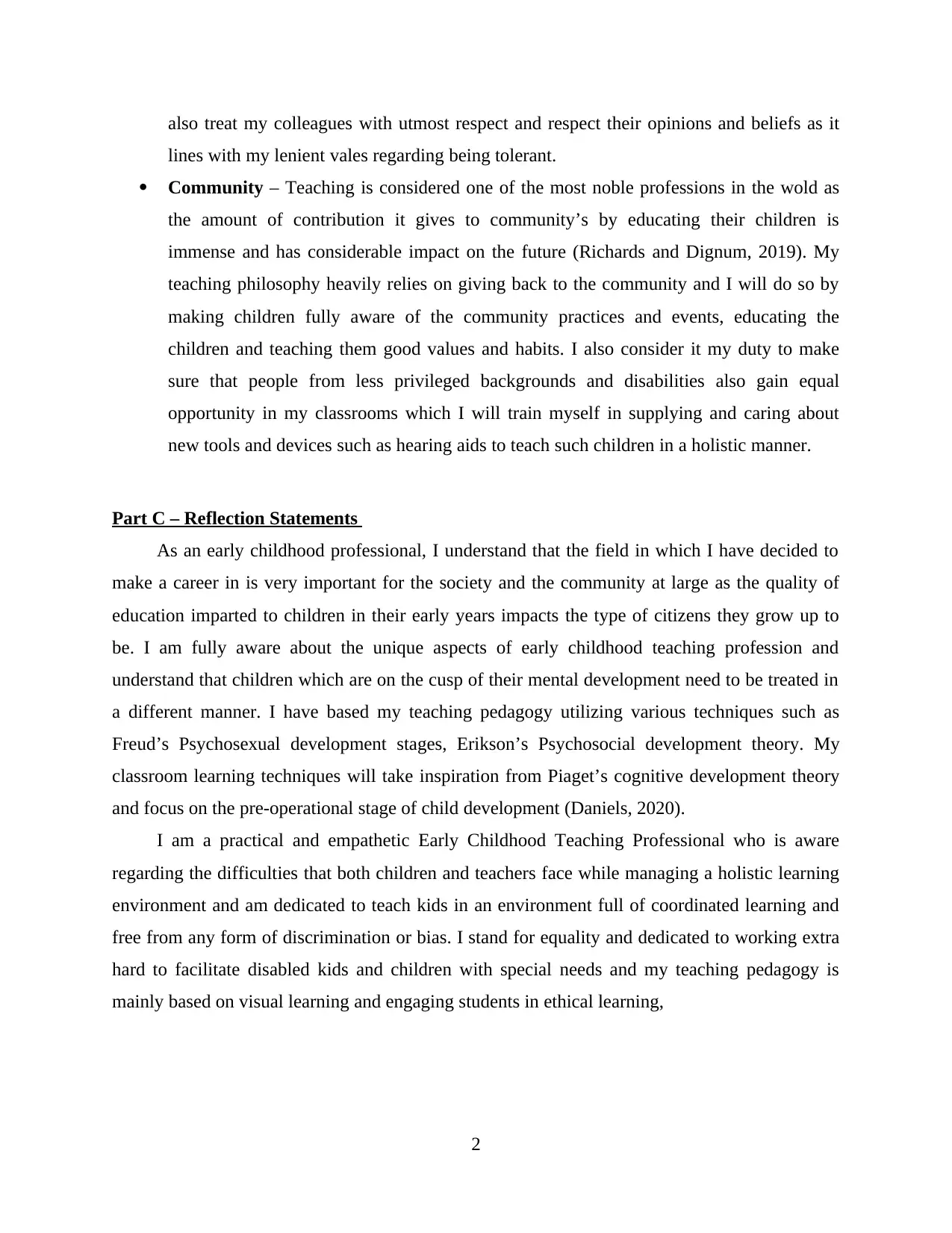
also treat my colleagues with utmost respect and respect their opinions and beliefs as it
lines with my lenient vales regarding being tolerant.
Community – Teaching is considered one of the most noble professions in the wold as
the amount of contribution it gives to community’s by educating their children is
immense and has considerable impact on the future (Richards and Dignum, 2019). My
teaching philosophy heavily relies on giving back to the community and I will do so by
making children fully aware of the community practices and events, educating the
children and teaching them good values and habits. I also consider it my duty to make
sure that people from less privileged backgrounds and disabilities also gain equal
opportunity in my classrooms which I will train myself in supplying and caring about
new tools and devices such as hearing aids to teach such children in a holistic manner.
Part C – Reflection Statements
As an early childhood professional, I understand that the field in which I have decided to
make a career in is very important for the society and the community at large as the quality of
education imparted to children in their early years impacts the type of citizens they grow up to
be. I am fully aware about the unique aspects of early childhood teaching profession and
understand that children which are on the cusp of their mental development need to be treated in
a different manner. I have based my teaching pedagogy utilizing various techniques such as
Freud’s Psychosexual development stages, Erikson’s Psychosocial development theory. My
classroom learning techniques will take inspiration from Piaget’s cognitive development theory
and focus on the pre-operational stage of child development (Daniels, 2020).
I am a practical and empathetic Early Childhood Teaching Professional who is aware
regarding the difficulties that both children and teachers face while managing a holistic learning
environment and am dedicated to teach kids in an environment full of coordinated learning and
free from any form of discrimination or bias. I stand for equality and dedicated to working extra
hard to facilitate disabled kids and children with special needs and my teaching pedagogy is
mainly based on visual learning and engaging students in ethical learning,
2
lines with my lenient vales regarding being tolerant.
Community – Teaching is considered one of the most noble professions in the wold as
the amount of contribution it gives to community’s by educating their children is
immense and has considerable impact on the future (Richards and Dignum, 2019). My
teaching philosophy heavily relies on giving back to the community and I will do so by
making children fully aware of the community practices and events, educating the
children and teaching them good values and habits. I also consider it my duty to make
sure that people from less privileged backgrounds and disabilities also gain equal
opportunity in my classrooms which I will train myself in supplying and caring about
new tools and devices such as hearing aids to teach such children in a holistic manner.
Part C – Reflection Statements
As an early childhood professional, I understand that the field in which I have decided to
make a career in is very important for the society and the community at large as the quality of
education imparted to children in their early years impacts the type of citizens they grow up to
be. I am fully aware about the unique aspects of early childhood teaching profession and
understand that children which are on the cusp of their mental development need to be treated in
a different manner. I have based my teaching pedagogy utilizing various techniques such as
Freud’s Psychosexual development stages, Erikson’s Psychosocial development theory. My
classroom learning techniques will take inspiration from Piaget’s cognitive development theory
and focus on the pre-operational stage of child development (Daniels, 2020).
I am a practical and empathetic Early Childhood Teaching Professional who is aware
regarding the difficulties that both children and teachers face while managing a holistic learning
environment and am dedicated to teach kids in an environment full of coordinated learning and
free from any form of discrimination or bias. I stand for equality and dedicated to working extra
hard to facilitate disabled kids and children with special needs and my teaching pedagogy is
mainly based on visual learning and engaging students in ethical learning,
2
Paraphrase This Document
Need a fresh take? Get an instant paraphrase of this document with our AI Paraphraser
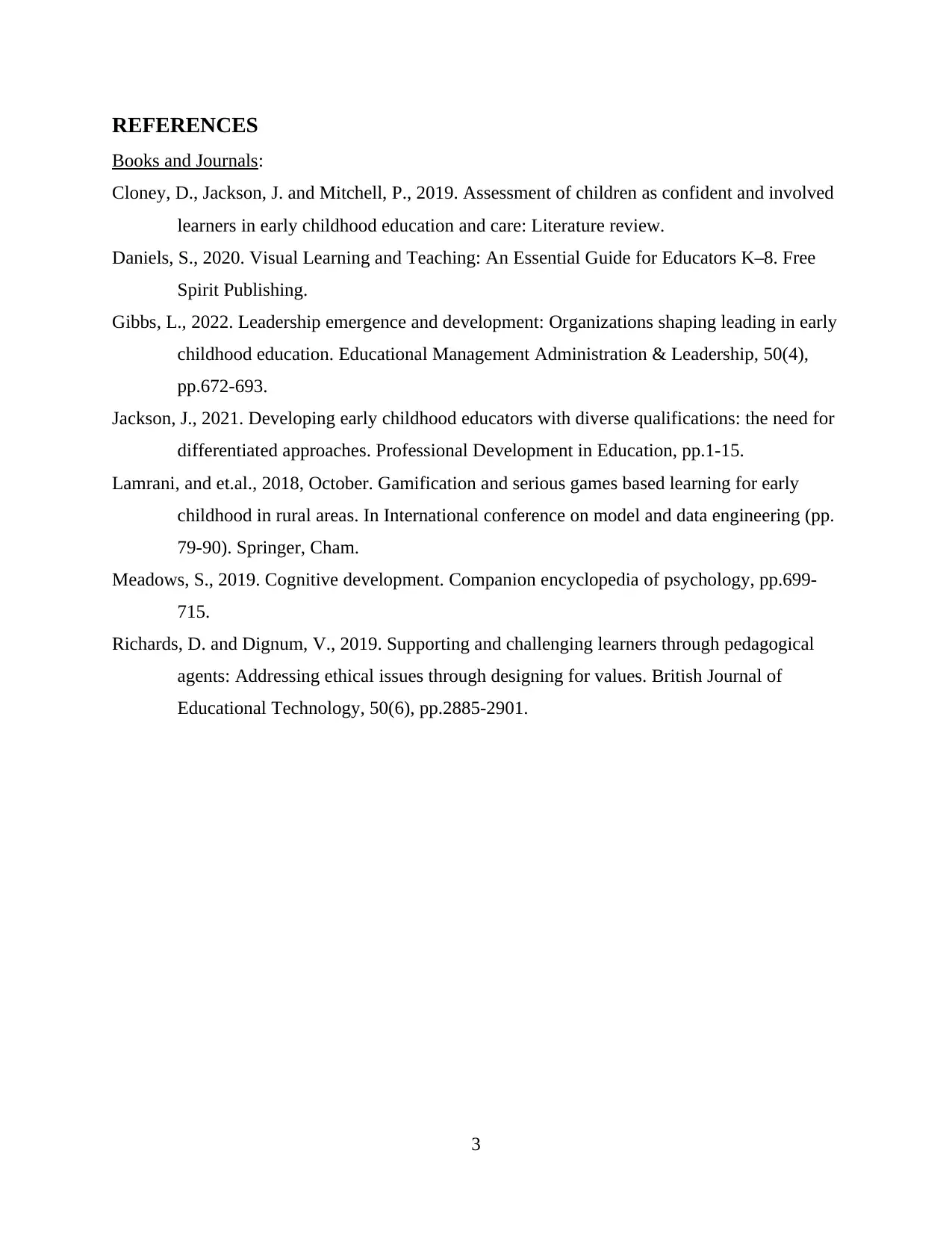
REFERENCES
Books and Journals:
Cloney, D., Jackson, J. and Mitchell, P., 2019. Assessment of children as confident and involved
learners in early childhood education and care: Literature review.
Daniels, S., 2020. Visual Learning and Teaching: An Essential Guide for Educators K–8. Free
Spirit Publishing.
Gibbs, L., 2022. Leadership emergence and development: Organizations shaping leading in early
childhood education. Educational Management Administration & Leadership, 50(4),
pp.672-693.
Jackson, J., 2021. Developing early childhood educators with diverse qualifications: the need for
differentiated approaches. Professional Development in Education, pp.1-15.
Lamrani, and et.al., 2018, October. Gamification and serious games based learning for early
childhood in rural areas. In International conference on model and data engineering (pp.
79-90). Springer, Cham.
Meadows, S., 2019. Cognitive development. Companion encyclopedia of psychology, pp.699-
715.
Richards, D. and Dignum, V., 2019. Supporting and challenging learners through pedagogical
agents: Addressing ethical issues through designing for values. British Journal of
Educational Technology, 50(6), pp.2885-2901.
3
Books and Journals:
Cloney, D., Jackson, J. and Mitchell, P., 2019. Assessment of children as confident and involved
learners in early childhood education and care: Literature review.
Daniels, S., 2020. Visual Learning and Teaching: An Essential Guide for Educators K–8. Free
Spirit Publishing.
Gibbs, L., 2022. Leadership emergence and development: Organizations shaping leading in early
childhood education. Educational Management Administration & Leadership, 50(4),
pp.672-693.
Jackson, J., 2021. Developing early childhood educators with diverse qualifications: the need for
differentiated approaches. Professional Development in Education, pp.1-15.
Lamrani, and et.al., 2018, October. Gamification and serious games based learning for early
childhood in rural areas. In International conference on model and data engineering (pp.
79-90). Springer, Cham.
Meadows, S., 2019. Cognitive development. Companion encyclopedia of psychology, pp.699-
715.
Richards, D. and Dignum, V., 2019. Supporting and challenging learners through pedagogical
agents: Addressing ethical issues through designing for values. British Journal of
Educational Technology, 50(6), pp.2885-2901.
3
1 out of 5
Related Documents
Your All-in-One AI-Powered Toolkit for Academic Success.
+13062052269
info@desklib.com
Available 24*7 on WhatsApp / Email
![[object Object]](/_next/static/media/star-bottom.7253800d.svg)
Unlock your academic potential
Copyright © 2020–2026 A2Z Services. All Rights Reserved. Developed and managed by ZUCOL.





